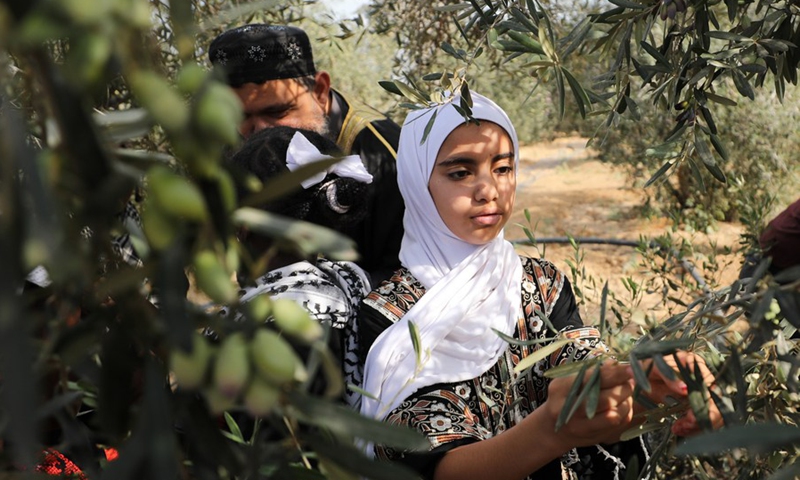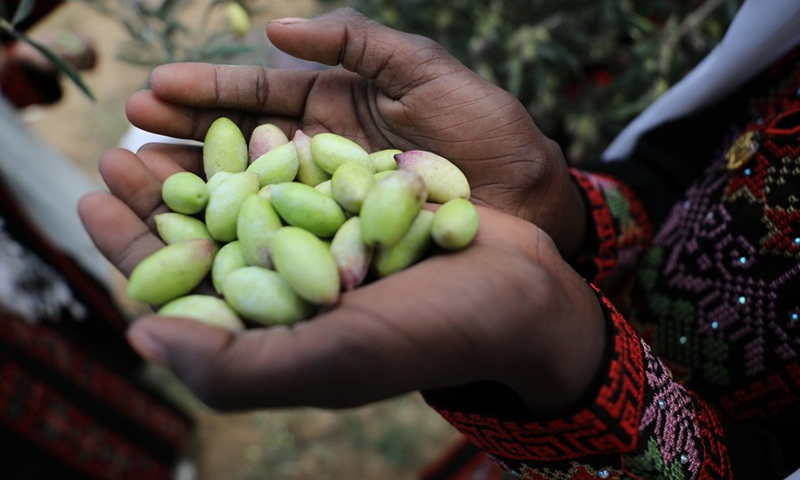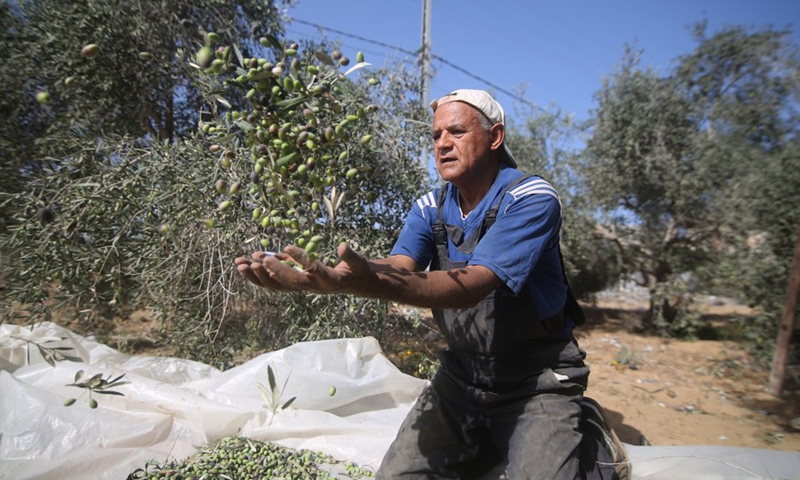
A Palestinian young girl, wearing a traditional embroidered dress, picks olives during the harvest season in Deir al-Balah city, central Gaza Strip, on Oct. 23, 2022. (Photo: Xinhua)

Olives are seen in the photo during the harvest season in Deir al-Balah city, central Gaza Strip, on Oct. 23, 2022. (Photo: Xinhua)

A Palestinian man works at an olive mill in the Deir al-Balah refugee camp in the central Gaza Strip, on Oct. 20, 2022. Farmers across the Palestinian territories have started to harvest olives, with many making olive oil and soap for themselves as well as for sale. (Photo: Xinhua)

A Palestinian displays olives at an olive orchard in the southern Gaza Strip city of Rafah, Oct. 1, 2022.(Photo: Xinhua)
Sharif al-Tamimi and other Palestinians who grow olives in parts of the West Bank under Israeli rule have founded the current harvest season more grueling than before, as the precious daylight hours were increasingly spent on getting Israeli security approvals.
As a resident of Tel Rumeida, a Palestinian town close to the city of Hebron, al-Tamimi grows 3.5-hectare of olive trees in Area C of the West Bank, which is under full Israeli security and administration control.
"Year by year, the Israeli authorities tighten the requirements that allow my neighbors and I to harvest our olive trees," the 42-year-old father of four told Xinhua.
Local harvest season usually starts in mid-October and lasts for some 45 days, but this year, al-Tamimi has to race against the clock to pick the fruits, since before which it took him nearly a month to get an Israeli permit for heading to the land.
A permit will not suffice. "Before arriving at our land, we must pass many electronic checkpoints and gates, while sometimes we cannot pass them as the soldiers ask us to come back to our houses," he explained.
Unable to irrigate and harvest in time, eventually the yield is poor.
"I can only collect about one ton of olives, less than 80 percent of what we are supposed to harvest," he said.
"The Israelis are doing their best to force the Palestinian residents to leave their lands and let settlers live there instead," said al-Tamimi's neighbor Akram Abu Shakhdam, another olive grower in Area C.
However, he added, "we will never give up the right to defend our lands by all available means."
Eisa Amro, a coordinator at a non-government Youths Against Settlement organization, told Xinhua that Palestinian farming in Areas B and C in the West Bank "has long suffered from Israel's seizure of lands and settlements expansion in an effort to make the occupancy an established reality."
According to the peace agreements signed between Israel and the Palestinians in the 1990s, the West Bank was divided into three areas, with Area A under full security and administrative control of the Palestinian Authority (PA), Area B under joint Israeli security control and PA administrative rule, while Area C under full Israeli control.
In Palestinian territories, olive farming generates an estimated income of 800 to 900 million U.S. dollars annually, contributing 20 to 25 percent of the total Palestinian economy, according to the Palestinian ministries of economic and agriculture.
In the Gaza Strip, the situation is a bit easier as the current harvest season is bountiful, and farmers can pick their crops without facing any obstacles.
"I have harvested about 90 percent of my olive trees after years of decline of my production because of the harsh climatic condition and other reasons," said Mohammed Abu Rujeila, a local farmer who owns a 30-hectare land in Khan Younis city south of Gaza.
Adham El-Bassiouni, a spokesman for the Palestinian Ministry of Agriculture in Gaza, told Xinhua that about 43,000 hectares of land are planted with olive trees in the Palestinian coastal enclave.
"About 35,000 hectares of them are fruitful. Each hectare can produce at least one ton of olives and this is enough for the coastal enclave consumption," he noted.
